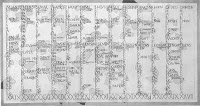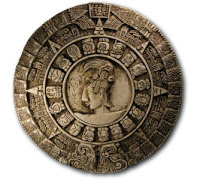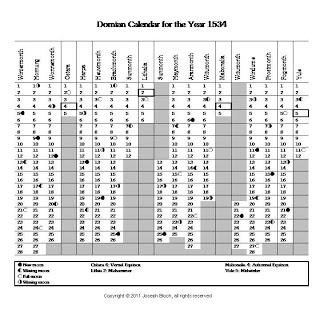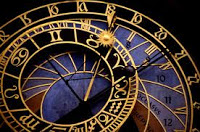In designing my home-brewed Erseta campaign (which is finally kicking off in about an hour and a half!), I wanted to avoid a common pitfall I see in any number of fantasy settings. Overly rational calendars.
In too many campaign settings, calendars are either ignored (leaving the game master to come up with something on his own and hope that the setting’s designer doesn’t come up with something completely at odds later on) or are too “easy”. Months are all exactly the same number of days, which happen to be divided into full weeks, and the sun and moon(s) obey the clockwork precision needed for the game master’s calendar to be perfectly symmetrical, orderly, and reusable in all years.
 Historically, calendars are very messy things. The orbits of heavenly bodies rarely acquiesce to humanity’s love of even numbers and symmetry. Not every civilization had weeks of seven days (or even weeks at all), and many were constantly tinkering with their calendars to make them more accurate, less complex, more in line with nature or what religious teachings taught about nature, or even for use as political tools. Even the most basic things, such as when the year actually begins, are subject to change.
Historically, calendars are very messy things. The orbits of heavenly bodies rarely acquiesce to humanity’s love of even numbers and symmetry. Not every civilization had weeks of seven days (or even weeks at all), and many were constantly tinkering with their calendars to make them more accurate, less complex, more in line with nature or what religious teachings taught about nature, or even for use as political tools. Even the most basic things, such as when the year actually begins, are subject to change.
Even the modern Gregorian calendar wasn’t adopted until 1752. To this day it’s not universally accepted, and some still use the Julian calendar or some other calendar altogether (Chinese, Muslims, Hindus, Jews, etc.).
So for my campaign I wanted something messy. Something that had a little character. So I came up with this (click to embiggen):
Erseta’s year is 373 days long. The High Church follows the old Erian calendar, which consists of a number of months of varying lengths plus several intercalary periods (note that Lithalia takes place in the middle of Sunmonth, and Mabonalia takes place in the middle of Witumonth). No “weeks” are used, and there are no “generic” names for days. Dates are calculated from the beginning of the month, and years are counted from the founding of the city of Eria. Example: The reign of Duke Roginald of Archanaovis began on the 11th day of Brachmonth in the year 1529 AE (After Eria). In this, it’s somewhat like the old Roman calendar, and I consciously used an ancient Roman calendar as the model for how this calendar is presented.
The moon follows a cycle of 32 days, constantly shifting in appearance and shape as it goes through its phases and slowly rotates to reveal its entire surface (it is not tidally locked, and thus does not always present the same face to the world). Indeed, a whole science of lunology has developed which predicts future events based not on the movements of the stars (although astrology is also practiced) but rather by which features are visible on the moon during which phases. The dates of the various cycles of the moon vary from year to year, but the solstices and equinoxes are constant.












There is another approach to making "irrational" calendars, which is to have the calendar be perfectly regular and have the underlying natural cycles not be, which is also quite historic. Many ancient timekeeping systems put a lot of power in the priests that could declare the intercalary months or other time units, which puts an interesting dimension to the calendar. It's easy to keep track of where you are in each month, but an extra one could get popped in at any time.
Nice! We've been reading through The Magical Calendar to help prep setting up our own irrational calendar for Wermspittle. It doesn't have to be uber-complicated to provide a wonderful mechanism for all sorts of fun stuff. Having elemental attributions built into the thing makes different times of the year more conducive or amenable to certain sorts of summoning, etc., for example…
I deliberately wanted to steer clear of having magical effects related to the calendar, although it's certainly a natural enough association.
A little part of that decision is that it would be more than slightly derivative of Dragonlance, which had the three schools of magic ruled by three moons (am I remembering that right?).
A larger part of the reason is that I might want to do a whole-cloth treatment of astrology (and, perhaps, lunology) as a generic add-on suitable for any old school-type game. I think it's easier to add something like that later, rather than change a half-baked idea that the players have gotten used to.
But the biggest part is that it just didn't seem like a good fit for the D&D-style magic system. If I can figure out something that has the right "feel" to me, I'll probably proceed with that generic supplement to cover it. But until I'm struck with the inspiration, I'm holding off.
Reading through my comment, I just want to make it plain that I'm not saying your system is half-baked, NetherWerks. Just that anything I came up with right now would be. 🙂
Overly rational calendars have always bugged me too. My usual approach to designing a calendar is to make up messy numbers for the natural cycles, then figure out how the people would deal with those cycles (“Let’s see… the lunar cycle is about a third of a day too long, so the most obvious way to deal with that is add an extra day to every third month…”). Then on top of that, I’ll have some nations use a regnal dating system (e.g., “on the 3rd of Tishri in the 5th year of the reign of Cleon I”). I’ve also toyed with the idea of numbering the days in a way similar to the Roman calendar, where the day numbers count down to certain special dates, like the ides or the nones.
One nit: 1752 is the date the Gregorian calendar was adopted by the British Empire. Several Catholic countries adopted it in 1582, and of course the Soviet Union didn’t adopt it until 1918.
Question: (and please don't take this as criticism) How many players have shown you that they are interested in learning the ins and outs of a calendar system that isn't based on the one we use every day, and that it adds to their enjoyment of the game?
I ask because I have always used a system based on our own calendar for the sake of simplicity and making it easy for players to grasp. My assumption has always been that players would not find this sort of thing enjoyable, and while I suspect I am correct on that assumption with regard to my home group, reading this post made me realize that I never actually asked them.
I'm not quite sure it's a question of "player enjoyment", unless one follows the dictum that making things (reasonably) difficult for players increases their enjoyment of the game.
What following this sort of system does, at least in theory, is to add a small bit of verisimilitude to the setting. In my own Erseta game the question of the calendar hasn't really come up (although the players are aware of how it works).
I've got some ideas to make the calendar relevant; holidays, moon phases, etc. that I'll be testing in play.